The Seagate IronWolf Pro 20TB is a CMR-based HDD, joining the recently launched WD Gold and Ultrastar DC HC560 20TB HDDs as the industry’s largest capacity data center drives. The new massive IronWolf Pro is a NAS-optimized AgileArray drive that combines RAID reliability and compatibility during the heavy 24×7 NAS workloads.
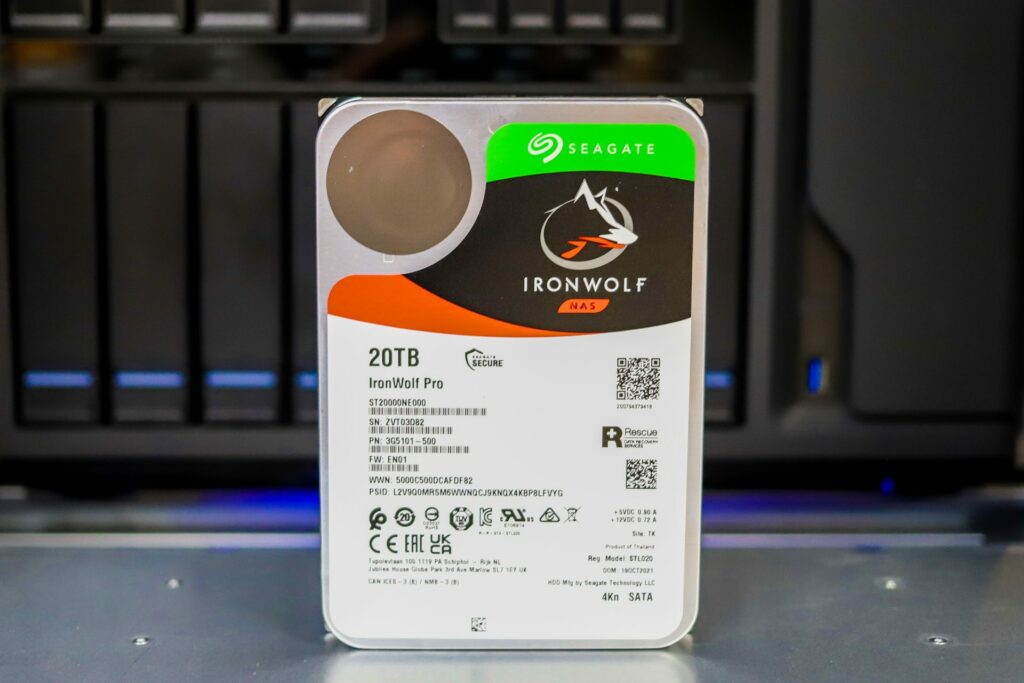
Seagate IronWolf Pro 20TB
There are a lot of benefits that come with the new 20TB capacity point, especially in large-scale, multi-user commercial and enterprise NAS environments in both creative professionals and SMB use cases. The new Seagate drives will also lessen the physical footprint of these servers and allow businesses to scale as their data needs grow.
For reliability, the new high-capacity IronWolf Pro features the same specifications as the 18TB model: 300TB per year workload for intensive client use cases coupled with a 1.2-million-hour MTBF rating. It also features built‐in RV sensors, which essentially accelerometers mounted on the HDD PCBA that provide an output proportional to acceleration, vibration, and shock. With it, drives like the IronWolf Pro are able to measure external forces dynamically, providing vital data that can be used to correct and compensate for these environmental changes.
Performance-wise, the IronWolf Pro 20TB is quoted with a max sustained transfer rate of 285MB/s. This is a noticeable increase compared to IronWolf 18TB model, which was set at 260MB/s. That said, those are best-case numbers, our testing in this review will highlight more attainable performance numbers.
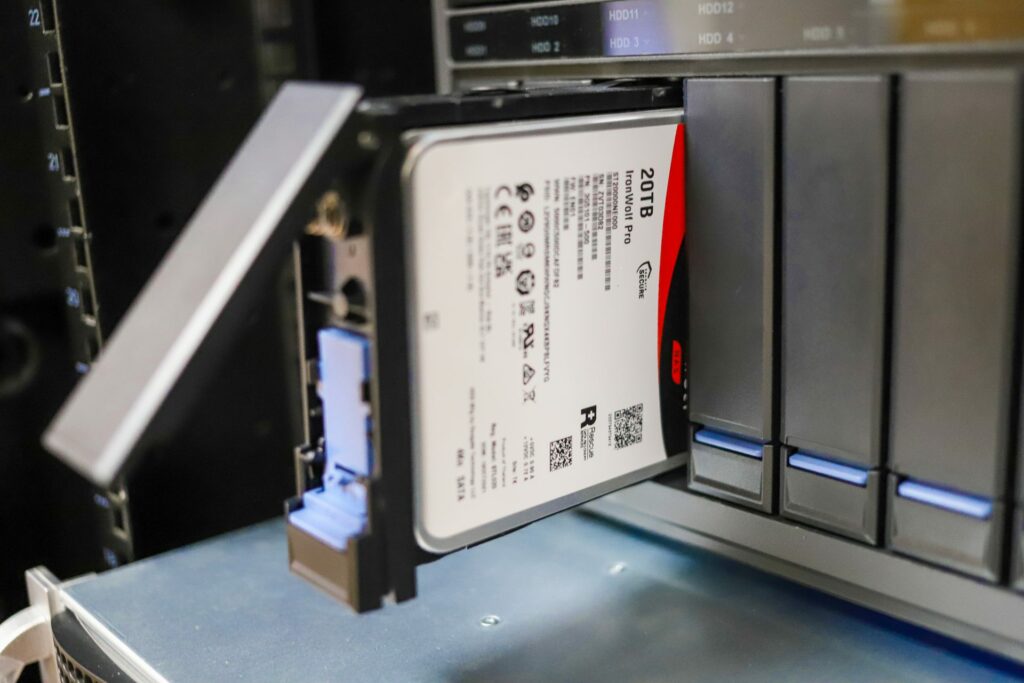
Though power consumption is very similar to the 18TB capacity model, there are a few notable differences. For example, while the average idle power of the 20TB model is slightly more (5.5W vs. 5.2W), its average output has decreased by 0.3W. Moreover, its standby mode is set at 1.0W (compared to 1.25W for the 18TB), which can lead to better overall power efficiency.
IronWolf Health Management (IHM) is also a big part of ensuring peak system health. With it, you will be able to gain more visibility into drive health and usage indicators such as temperature, shock, vibration, intermittent connections, and signal integrity. Users can then take action based on this information to ensure their data is always safe and secure.
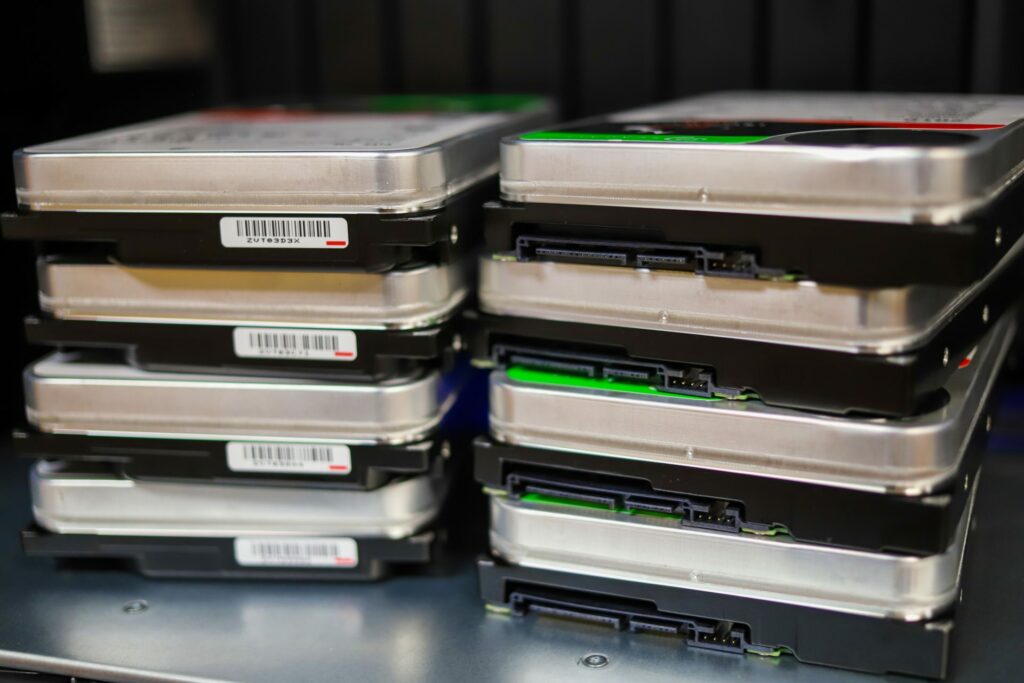
For added peace of mind, the IronWolf Pro 20TB is backed by both a 5-year warranty and 3 complimentary years of the company’s extensive Rescue Data Recovery Services. The latter will aid users in recovering data due to accidental corruption or drive damage. Seagate indicates that their recovery services have a 95% success rate.
Seagate IronWolf Pro 20TB NAS HDD Specifications
| Capacity | 20TB |
| Standard Model Number | ST20000NE000 |
| Interface | SATA 6Gb/s |
| Features | |
| Drive Bays Supported | Up to 24‐bay |
| Recording Technology | CMR |
| Drive Design (Air or Helium) | Helium |
| Workload Rate Limit (TB/yr) | 300 |
| Rotational Vibration (RV) Sensors | Yes |
| Cache (MB) | 256 |
| Reliability | |
| Mean Time Between Failures (MTBF, hours) | 1.2M |
| Reliability Rating @ Full 24×7 Operation (AFR) | 0.73% |
| Non‐recoverable Read Errors per Bits Read, Max | 1 per 10E15 |
| Power‐On Hours (per year) | 8760 |
| Sector Size (Bytes per Logical Sector) | 512E |
| Rescue Data Recovery Services (years) 3 | 3 |
| Limited Warranty (years) | 5 |
| Performance | |
| Spindle Speed (RPM) | 7200 |
| Interface Access Speed (Gb/s) | 6.0, 3.0, 1.5 |
| Max Sustained Transfer Rate OD (MB/s) | 285 |
| Rotational Vibration @10‐1500Hz (rad/s2) | 12.5 |
| Power Consumption | |
| Startup Current, Typical (12V, A) | 2.0 |
| Idle Power, Average (W) | 5.5 |
| Average Operating Power (W) | 7.7 |
| Standby Mode (W) | 1.0 |
| Sleep Mode (W) | 1.0 |
| Power Supply Requirements | +12V and +5V |
| Environmental | |
| Operating Temperature (ambient, min °C) | 0 |
| Operating Temperature (drive reported, max °C)4 | 65 |
| Nonoperating Temperature (ambient, min °C) | ‐40 |
| Nonoperating Temperature (ambient, max °C) | 70 |
| Non‐operating Vibration 10Hz to 500Hz (Grms) | 2.27 |
| Acoustics, Idle (typical, measured in Idle 1 state) (dBA) | 28 |
| Acoustics, Seek (typical) (dBA) | 32 |
| Operating Shock2 ms (Read/Write) (G) | 40/40 |
| Non‐operating Shock 1 ms and 2 ms (G) | 200 |
| Physical | |
| Height (mm/in, max) | 26.11/1.028 |
| Width (mm/in, max) | 101.85/4.01 |
| Depth (mm/in, max) | 146.99/5.787 |
| Weight (g/lb, typical) | 670/1.477 |
Seagate IronWolf Pro 20TB NAS HDD Performance
For testing, we looked at 8 of the IronWolf Pro 20TB drives using a RAID6 configuration inside our QNAP TS-1685.
Enterprise Synthetic Workload Analysis
Our enterprise hard drive benchmark process preconditions each drive-set into steady-state with the same workload the device will be tested with under a heavy load of 16 threads, with an outstanding queue of 16 per thread. The device is then tested in set intervals in multiple thread/queue depth profiles to show performance under light and heavy usage. Since hard drives reach their rated performance level very quickly, we only graph out the main sections of each test.
Preconditioning and Primary Steady-State Tests:
- Throughput (Read+Write IOPS Aggregate)
- Average Latency (Read+Write Latency Averaged Together)
- Max Latency (Peak Read or Write Latency)
- Latency Standard Deviation (Read+Write Standard Deviation Averaged Together)
Our Enterprise Synthetic Workload Analysis includes four profiles based on real-world tasks. These profiles have been developed to make it easier to compare to our past benchmarks, as well as widely-published values such as max 4K read and write speed and 8K 70/30, which is commonly used for enterprise drives.
- 4K
-
- 100% Read or 100% Write
- 100% 4K
- 8K 70/30
- 70% Read, 30% Write
- 100% 8K
- 128K (Sequential)
- 100% Read or 100% Write
- 100% 128K
Comparables:
Looking at our throughput test which measures 4K random performance, the 20TB Seagate IronWolf Pro posted 9,431 IOPS read and 957 IOPS write in SMB, while iSCSI hit 8,272 IOPS read and 1,026 IOPS write. These were fairly similar to the 18TB model, which showed iSCSI performance of 8,373 IOPS read and 1,065 IOPS write. In SMB, the 18TB IronWolf posted 9,451 IOPS read and 862 IOPS write.
Next, we move on to 4K average latency. Here, the 20TB IronWolf Pro showed 27.14ms read and 267.35 write (noticeably better than the 18TB capacity) in SMB, while reaching 30.94ms read and 249.44ms write in iSCSI. The 18TB model showed 240.19ms latencies of write and 30.57ms read in the iSCSI configuration while SMB recorded 296.75ms write and 27.08ms read.
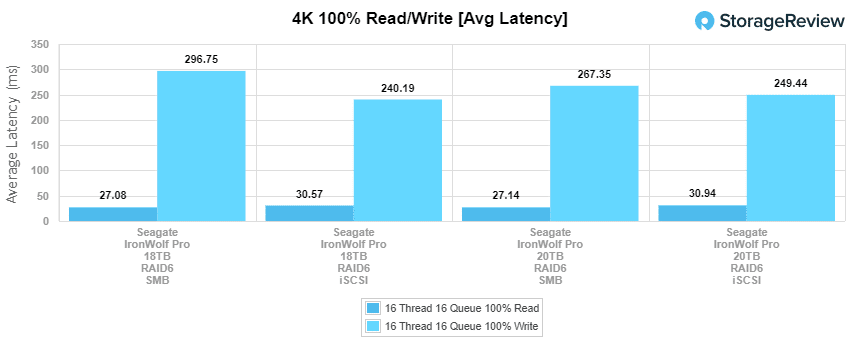
With 4K max latency, the 20TB IronWolf Pro showed significantly higher latency than the 18TB model in iSCSI, posting 1,441.3ms read and 13,894ms write. SMB had a much better 838.50ms read and 1,810.2ms write. In comparison, the 18TB model hit 1,304.2ms read and 1,568.2ms write in iSCSI while showing 899.43ms read and 4,746ms write in SMB.
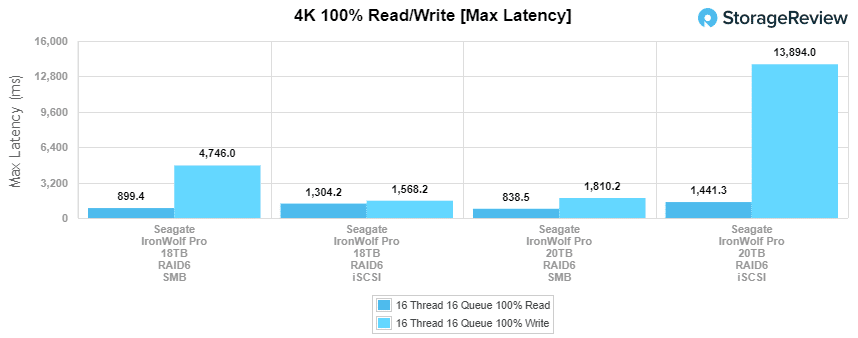
In standard deviation, the 20TB model showed a much higher write latency in iSCSI again, posting 743.14ms with 61.38ms read. SMB showed 173.74ms write and 36.58ms read. The 18TB IronWolf showed reads and writes of 64.62ms and 421.35ms in iSCSI, respectively, while SMB hit 36.173ms and 228.98ms in SMB.
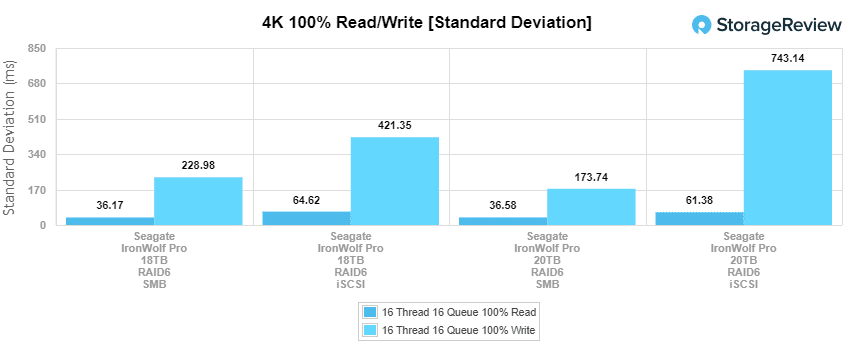
The next benchmark tests the drives under 100% read/write activity, but this time at 8K sequential throughput. Here, the 20TB model showed an improvement in iSCSI performance, hitting 224,071 IOPS read and 106,912 IOPS write. However, in SMB, it was outpaced slightly by the 18TB model in reads, hitting 58,490 IOPS read and 44,902 IOPS write. The 18TB showed 223,428 IOPS read and 90,480 IOPS write in iSCSI, while SMB saw 60,662 IOPS alongside its 42,838 IOPS write.
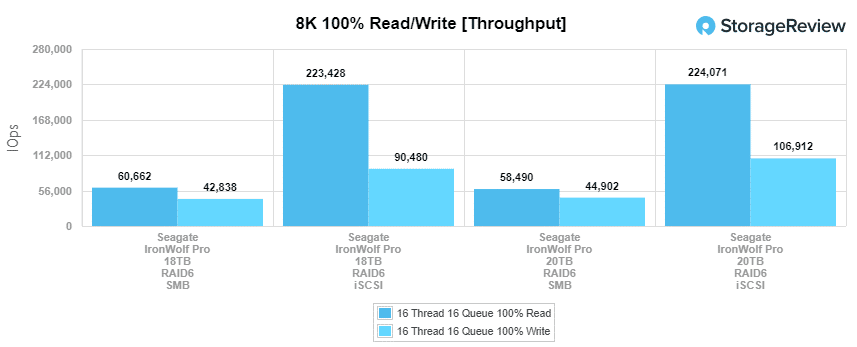
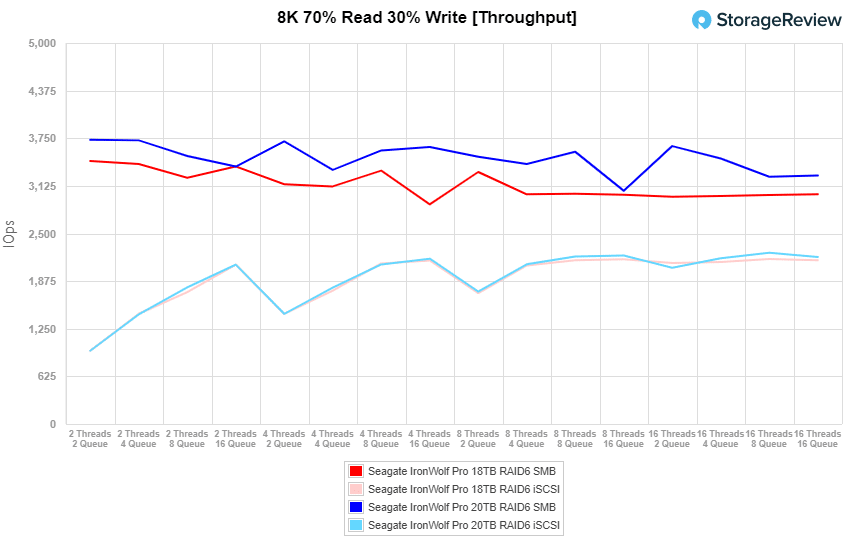
With average latency at 8K 70/30, the 20TB saw improved overall results again. Here, it showed 4.15ms through 116.71ms in iSCSI, and 1.06ms through 78.36ms in SMB. The 18TB Seagate IronWolf showed a range of 4.14ms through 118.95ms in iSCSI, while SMB had a range of 1.15ms through 84.81ms.
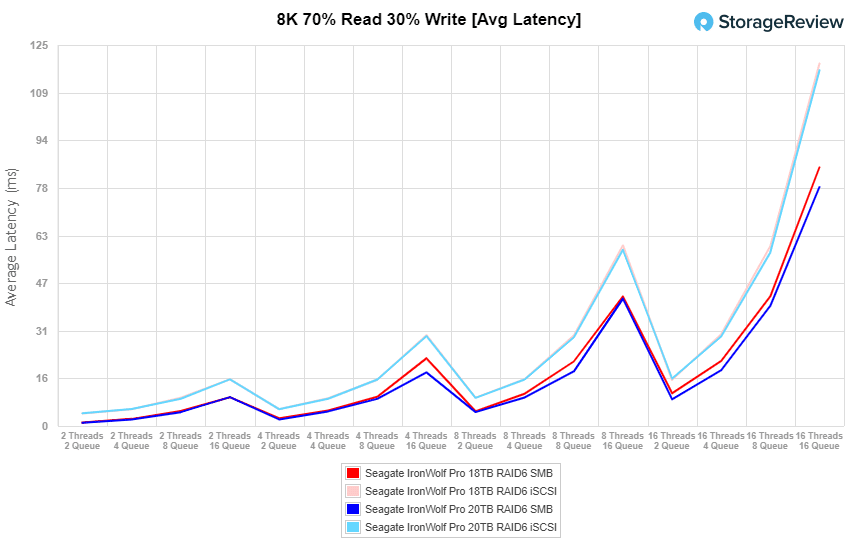
Moving on to max latency numbers, the 20TB IronWolf Pro had a range of 280.66ms to 1,602.52ms (iSCSI) and 53.46ms to 981.12ms (SMB). The 18TB Seagate IronWolf posted a range of 69.85ms to 875.5ms in SMB, while iSCSI showed 267.54ms through 1,602.42ms in the terminal queue depths.
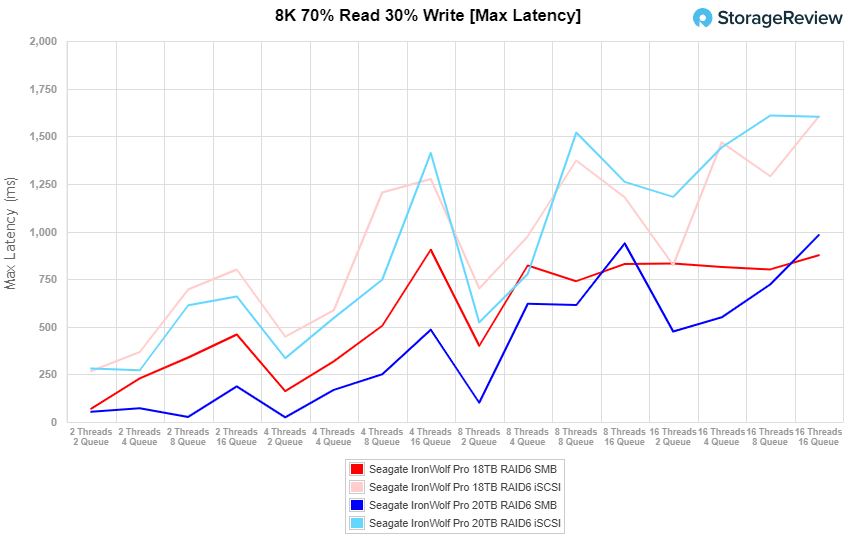
The standard deviation latency results, the 20TB model hit 0.95ms through 28.13ms (SMB) and 10.24ms through 176.57ms. This was an improvement over the 18TB model, which showed a range of 0.98ms to 33.34ms in SMB and 10.07ms through 195.02ms in iSCSI.
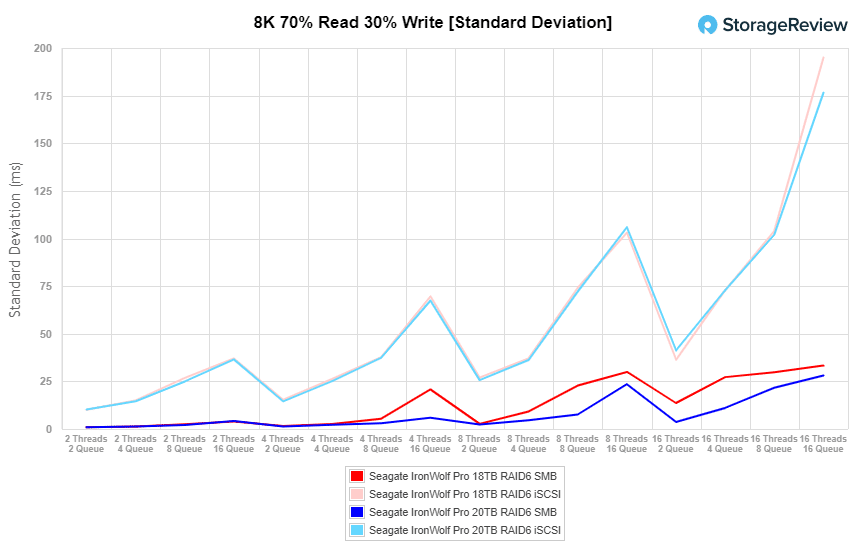
Our last test is the 128K benchmark, which is a large-block sequential test that shows the highest sequential transfer speed. Here, 20TB model hit 2.31GB/s read (same as the 18TB model) and 1.58GB/s write in SMB, while reaching 1.99GB read and 2.24GB/s write in iSCSI. The 18TB Seagate IronWolf showed 2.31GB/s read and 1.33GB/s write in SMB, while iSCSI had 1.96GB/s read and 1.89GB/s write.
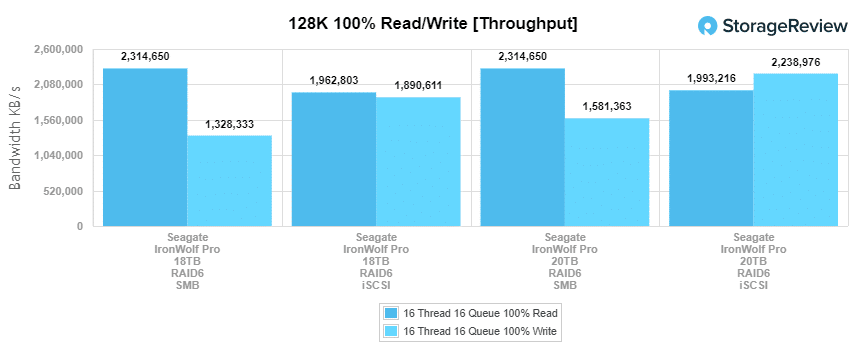
Conclusion
The new Seagate IronWolf Pro 20TB capacity is a solid addition to the market’s high-capacity data center offerings, joining with the Seagate Exos X20 as the industry’s highest-capacity commercial hard drives. This CMR-based drive is NAS-optimized with AgileArray, combining RAID reliability and compatibility for exceptional performance during heavy 24×7 NAS workloads.
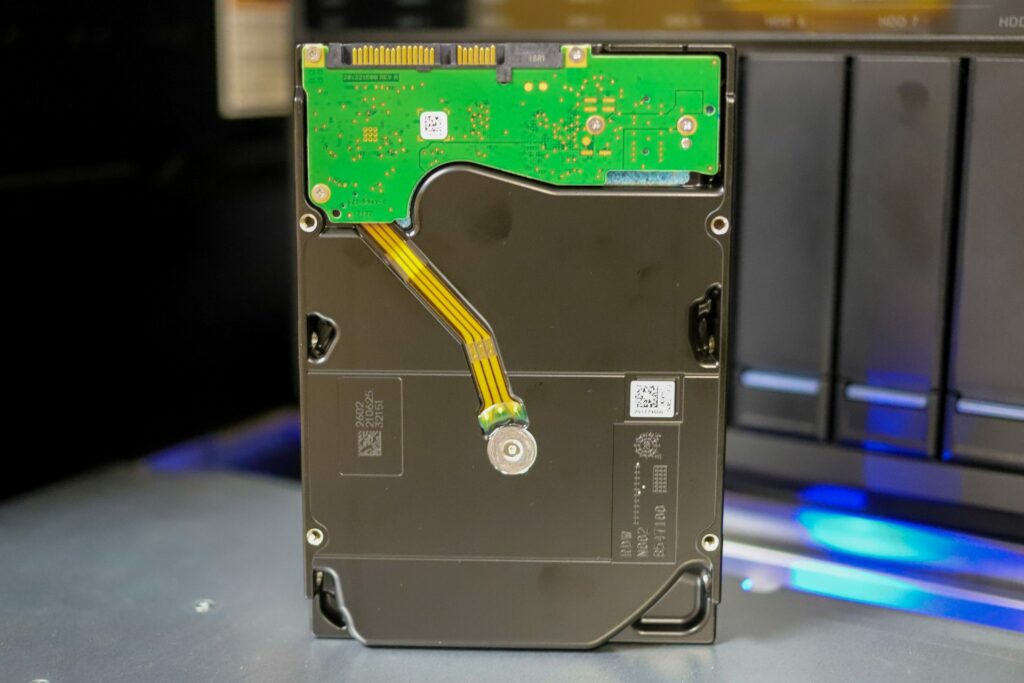
Looking at its performance results (which we tested using both iSCSI and SMB connectivity of eight drives in RAID6), the Seagate IronWolf Pro 20TB showed some solid numbers and an overall improvement over the 18TB model. During our FIO workloads, the new Seagate drive showed 4K random performance of 8,272 IOPS read and 1,026 IOPS write (iSCSI) and 9,431 IOPS read and 957 IOPS write (SMB).
Looking at workloads under 100% read/write activity 8K sequential throughput, the 20TB Seagate IronWolf Pro was able to reach 224,071 IOPS read and 106,912 IOPS write in iSCSI (an improvement over the 18TB model), while SMB saw 58,490 IOPS read and 44,902 IOPS write. In our mixed 8K 70/30 workload, which will demonstrate how performance scales in a setting from 2T/2Q up to 16T/16Q, the new Seagate drive started at 3,729 IOPS while ending at 3,262 IOPS in the terminal queue depths (SMB), while posting a range of 962 IOPS to 2,192 IOPS in iSCSI. This was also a slight boost in performance over the smaller capacity model.
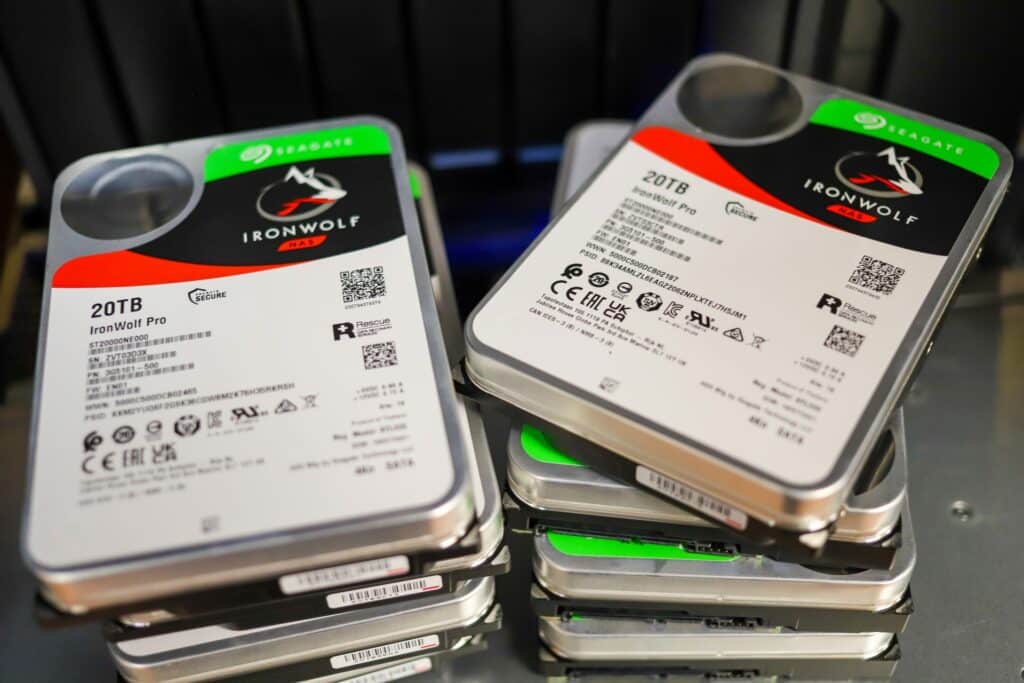
Finally, in our large-block sequential 128K benchmark, the 20TB model hit 2.31GB/s read (same as the 18TB model) and 1.58GB/s write in SMB while reaching 1.99GB read and 2.24GB/s write in iSCSI (noticeably better than the 18TB model).
The increase in capacity is fairly significant, especially for organizations that leverage larger NAS systems (up to 24 bays); those extra TBs certainly add up in environments of this size. Coupling all of this with its solid performance (an overall improvement over the 18TB model), 300TB per year workload rating, RV sensors to compensate for environmental changes, and its 1.2 million hour MTBF makes the IronWolf Pro 20TB a great choice for those looking to get the most out of their capacity-driven NAS environments.


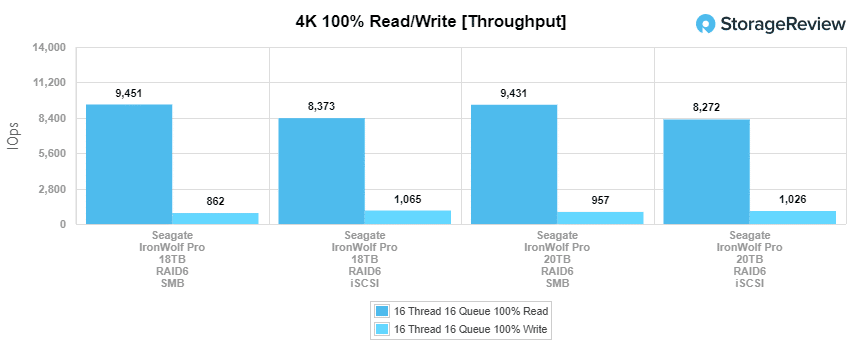


 Amazon
Amazon